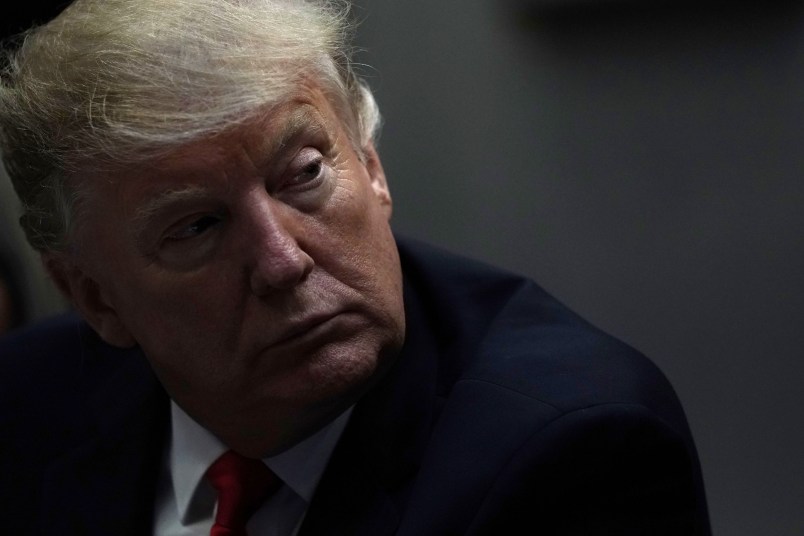An appellate court panel in New York grilled President Trump’s personal attorney about his claims that Trump’s financial records cannot be subpoenaed by state prosecutors from his accounting firm.
At one point, Judge Denny Chin asked Trump’s personal lawyer William Consovoy what kind of investigation the local police could do if a sitting President shot someone on 5th Avenue.
Consovoy at first said there could be no investigations done until the President was impeached. Pressed again, he clarified that some investigation work could be done, but it could not involve the President or the custodians of his records.
The case, Trump v. Vance, was in front of the U.S. Second Circuit Court of Appeals Wednesday. Trump is challenging subpoenas to his accounting firm and his business for his financial records issued by Manhattan’s district attorney Cy Vance.
During the oral arguments Consovoy was battered by questions from the appellate judges, who sounded skeptical of the extraordinary arguments Trump is making in the case.
Trump is asserting the presidents are immune from criminal investigations led by both federal and state prosecutors.
“If the President were to commit a crime, no matter how heinous, whether he did before he took office or whether he did it after he took office, he could not be the subject even of an investigation. That’s the position?” Chin asked.
“Yes,” Consovoy said, adding that once he was impeached and removed by Congress, he would be subject to state and federal law enforcement jurisdiction.
“What is the irreparable harm that your client would suffer” if the financial records were disclosed to the grand jury, Chief Judge Robert Katzmann argued, noting that other entities such as regulators also hold the records.
Consovoy was also grilled on his argument that the subpoena would unconstitutionally distract the president from his duties. The judges noted that it was a third party — his accounting firm Mazars — that has been subpoenaed.
The judges also pointed to legal memos cited by Trump and brought up that they addressed indictments and prosecutions of a sitting president, not criminal investigations.
“The Moss memo,” Katzmann said, referring to a memorandum issued by the Justice Department in 2000, “seems to suggest that there are things that can be gathered while the president is still president.”
The case is one of several that President Trump’s personal attorneys have brought to shield his financial records from scrutiny.
A district court judge previously upheld Vance’s subpoena. U.S. District Judge Victor Marrero’s opinion said that the federal judiciary did not have the authority to settle the dispute, but if it did, he would dismiss the challenge to the subpoena. Vance is asking the appeals court to uphold both elements of that decision.
Lingering over Wednesday’s hearing was the inevitably that the Supreme Court will be the final word on the subpoena’s legality. Regardless what the appeals court decides, Vance has already agreed to not enforce the subpoena until the Supreme Court is given the chance to weigh in on the dispute.
The appellate court judges had pointed questions for Carey Dunne, the general counsel for the Manhattan district attorney, as well. They quizzed him on the confidentiality obligations the district attorney would have to abide by if the documents were produced, and about whether, if the subpoena was enforced, Trump would have a seperate opportunity to challenge the legality of a state indictment brought against him.
Dunne said the records would be kept private up until the point they could become public in a typical criminal case — as exhibits at trial. He also attacked the arguments Trump was making about there being a specific privilege for tax returns: “They’re making this up, your Honor, that’s all I can say.”
He also noted that Trump would have a separate opportunity to litigate whether he can face state charges. Under state procedural law, Dunne said, Trump’s attorneys could request notice of when the district attorney’s office is contemplating asking the grand jury to bring a indictment against him.
“It would put them on notice that yes now the time is ripe if they want to interpose a claimed immunity from indictment,” Dunne said.







Hmmm…those don’t exactly sound like winning arguments, more like grasping at straws.
When Trump first met with the nation’s governors he said, “make states the laboratories of democracy once again”.
Must have changed his mind again.
Trump wouldn’t be in this pickle if he’d released his tax returns, as he promised. We can’t have a democracy without transparency, and that includes financial records.
Have they argued he can’t be investigated, charged, and is completely above the law? I heard they are trying to lock that down
Trump’s legal arguments are specious. It’s all a delay tactic. He doesn’t want his taxes or grand jury materials from the Mueller probe released during impeachment. A good appellate panel knows it and will decide the case quickly.